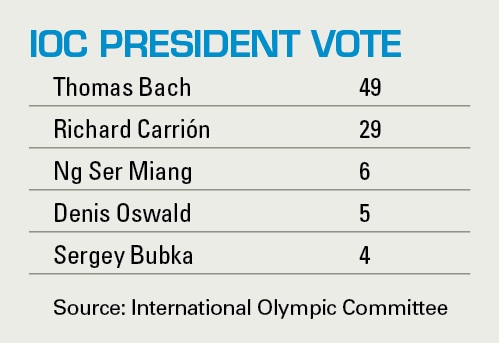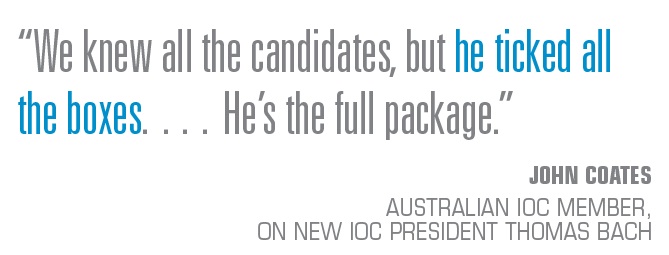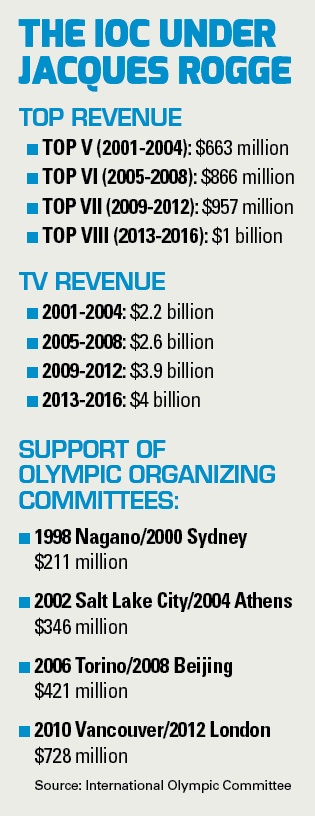An hour after his election as president of the International Olympic Committee, Thomas Bach was fielding media questions about Russia’s anti-gay laws and Brazil’s construction delays in Rio when Sochi 2014 CEO Dmitry Chernyshenko tapped his shoulder.
“President Putin,” Chernyshenko said as he handed Bach a mobile phone.
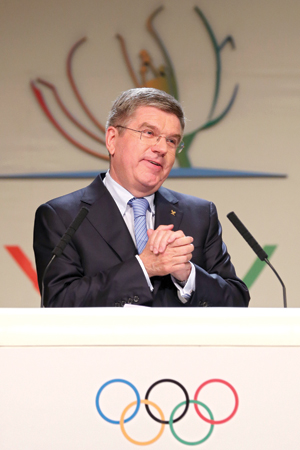 |
New IOC President Thomas Bach
Photo by: GETTY IMAGES
|
Bach stepped away from the press and chatted with the Russian president for a few minutes. When he returned, he smiled broadly and his cheeks reddened.
“We did not discuss the law,” he said, chuckling.
The call signaled just how much life changed for Bach last week. He came to Buenos Aires as a 59-year-old German lawyer, the head of Germany’s national Olympic committee and one of six candidates vying to become the IOC’s ninth president, taking over for Belgian Jacques Rogge. He left holding one of the most powerful jobs in global sports — a position so prestigious that heads of state call to extend their congratulations.
This was the IOC’s second presidential election in 30 years, and Bach began campaigning for it years ago. His efforts made him a front-runner going into the election and earned him a second-round victory over a field that included Sergey Bubka, the Ukrainian pole vaulting gold medalist; Richard Carrión, the
Puerto Rican CEO of Banco Popular; Ng Ser Miang, the Singaporean businessman; Denis Oswald, a Swiss lawyer and Olympic rower; and C.K. Wu, the Taiwanese architect and head of the boxing federation.
“We knew all the candidates, but he ticked all the boxes,” said Australian IOC member John Coates. “He’s president of a [national Olympic committee]. He’s an athlete. He’s got good corporate background. He negotiated TV rights deals. He’s the full package.”
In the end, it was the combination of all of those things and extensive lobbying that won Bach’s fellow members’ confidence. His election closed one of the busiest IOC sessions in recent years.
Over a period of five days at the Hilton Buenos Aires in the city’s redeveloped dock area, the organization awarded Tokyo the 2020 Summer Games, put wrestling back into the Olympics and named a new president.
At the center of it all was Kuwaiti IOC member Sheikh Ahmad Al-Fahad Al-Sabah, who has emerged as one of the organization’s power brokers. The sheikh, who is the president of the Olympic Council of Asia, placed his support behind all three winners, and though none of them were a long shot, his influence was considered important enough that some observers even developed shorthand for Ahmad’s well-known preferences, calling it the “TWB strategy” — Tokyo, wrestling, Bach.
The significance of his support was on full display when he arrived at Tokyo’s victory celebration. When Ahmad came through the door, the party practically stopped. The room parted and people stood to each side applauding as he walked through the party, nodding to the pleased Japanese delegation. It was a stunning scene of international sports influence.
In terms of the presidential race, Ahmad made it known early and, in violation of IOC rules, publicly that he was supporting Bach’s candidacy. Throughout the week, he could be seen in the hotel lobby, shaking some members’ hands and kissing others on the cheek. He even huddled with Bach at the start of the hourlong coffee break preceding the vote, and then they split up and worked the room separately.
The other candidates campaigned alone around them. Wu could be seen with one arm over the shoulder of Spanish IOC member Juan Antonio Samaranch Jr., and Bubka and Carrión appealed one-on-one to several fellow members. Each of them knew that their only chance was for the vote to go far enough beyond two rounds so that enough voters could shift from eliminated candidates to create a true rival to Bach.
But that never happened. Bach won in the second round, and when it was finally over, the sheikh expressed some regret that the focus seemed to be on him rather than the new president.
“I am not upset for what people say about me,” Ahmad said when asked about the perception that he’s a power broker. “I am upset that we would decrease the reality of Bach. Bach is one of the main people who play a role in the movement. He was always on the [executive board]. He has a lot of mettle in the Olympic Games and always when there was difficulty, Bach was one of the IOC members depended on by Samaranch or Jacques Rogge. Don’t give me more power and decrease the gentleman.”
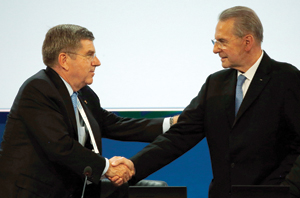 |
Bach gets an IOC in better shape than when predecessor Jacques Rogge became president.
Photo by: GETTY IMAGES
|
Ahmad had a point. As much as he may have done to lobby on Bach’s behalf, it was the German’s unparalleled résumé that helped him win the support of members. He won a gold medal in fencing at the 1976 Olympics, served on the executive board since 1996, chaired the organization’s legal commission and led the German Olympic committee, one of the world’s largest and most commercially successful.
For all the controversy the sheikh’s support stoked, Bach’s election surprised few. He is the organization’s fourth consecutive European president, dating more than 40 years, and he provides the type of continuity IOC members wanted as the organization looks to the future.
Rather than proposing radical changes, his campaign was built around the promise of bringing the organization together and building consensus. He said he wants to evaluate the organization’s bid city process, procedures for selecting new sports for the Olympics and explore the possibility of launching an Olympic TV network. But he’s made no specific promises on anything and said he wouldn’t look at an Olympic network for at least five years.
He takes over the IOC in far better shape than when Rogge became president 12 years ago. There is nearly $1 billion in reserves and the IOC has expanded its footprint into China, Russia and Brazil. But a host of challenges remain.
Sponsors have been unsettled by the way the IOC has responded to gay rights advocates’ criticism of Russia’s anti-gay propaganda law, and preparations for the 2016 Rio Olympics are behind schedule.
There also is concern about the future of the IOC’s business model. The organization’s prestigious TOP program is under pressure to change the pricing or structure and assets it offers worldwide sponsors. Carrión, who also serves as the IOC’s audit commission chairman, told members that revenue growth will be modest in the years ahead.
Bach is as equipped as anyone to tackle those issues. Viewed as decisive and dependable, his eye for strategy and business opportunity was on display in his work with the IOC television and marketing services to change the organization’s approach to TV rights in Europe. He spearheaded a new strategy that involved moving from selling regional rights in Europe and Asia to selling national rights in each country. In Europe, the approach led to a $133 million increase in TV rights by selling rights in Italy, Germany, the United Kingdom and elsewhere.
But in the moments after the IOC election, Bach’s focus was elsewhere. He stood at a high-top table in the Hilton lobby with his wife eating lunch as IOC member after IOC member came over to congratulate him.
Eventually, someone handed him a photocopy of the official vote tally. He ran his finger beneath his name and across the paper to the number 49. He shook his head and smiled, still in disbelief.



